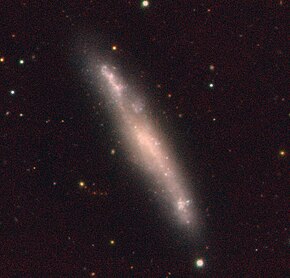| NGC 7 | |
|---|---|

ESO KIDS image of NGC 7 | |
| Observation data (J2000 epoch) | |
| Constellation | Sculptor |
| Right ascension | 00h 08m 20.3s [1] |
| Declination | −29° 55′ 01″ [1] |
| Redshift | 0.004987 [2] |
| Heliocentric radial velocity | 1495 ± 2 km/s [2] |
| Distance | 71.4 ± 5.2 M
ly (21.9 ± 1.6 M pc) [3] |
| Apparent magnitude (V) | 13.5 [2] |
| Absolute magnitude (V) | −17.83 [4] |
| Characteristics | |
| Type | SBc [5] |
| Apparent size (V) | 2.2′ × 0.5′ [2] |
| Other designations | |
| MCG-05-01-037, ESO 409-G022, AM 0005-301, PGC 627, h 4014, GC 2 [6] | |
NGC 7 is a barred spiral galaxy located in the Sculptor constellation. It was discovered by English astronomer John Herschel in 1834, who was using an 18.7 inch reflector telescope at the time. [6] Astronomer Steve Gottlieb described the galaxy as faint, albeit large, and edge-on from the perspective of the Milky Way; he also noted how the galaxy could only be observed clearly with peripheral vision, not by looking directly at it. [6]
References
- ^ a b "NGC 7". SIMBAD. Centre de données astronomiques de Strasbourg. Retrieved 2021-02-02.
- ^ a b c d "NASA/IPAC Extragalactic Database". Results for NGC 0007. Retrieved 2010-05-03.
- ^ "Distance Results for NGC 0007". NASA/IPAC Extragalactic Database. Retrieved 2010-05-03.
- ^ "The galaxy NGC 7".
- ^ "Search specification: NGC 7". HyperLeda. Université Claude Bernard Lyon 1. Retrieved 2021-02-02.
- ^ a b c "DSS Images for NGC 000 thru NGC 099". NGC/IC Project. Association of Universities for Research in Astronomy, Inc. Archived from the original on 26 September 2007. Retrieved 25 November 2008.
External links
Wikimedia Commons has media related to
NGC 7.
- NGC 7 on WikiSky: DSS2, SDSS, GALEX, IRAS, Hydrogen α, X-Ray, Astrophoto, Sky Map, Articles and images